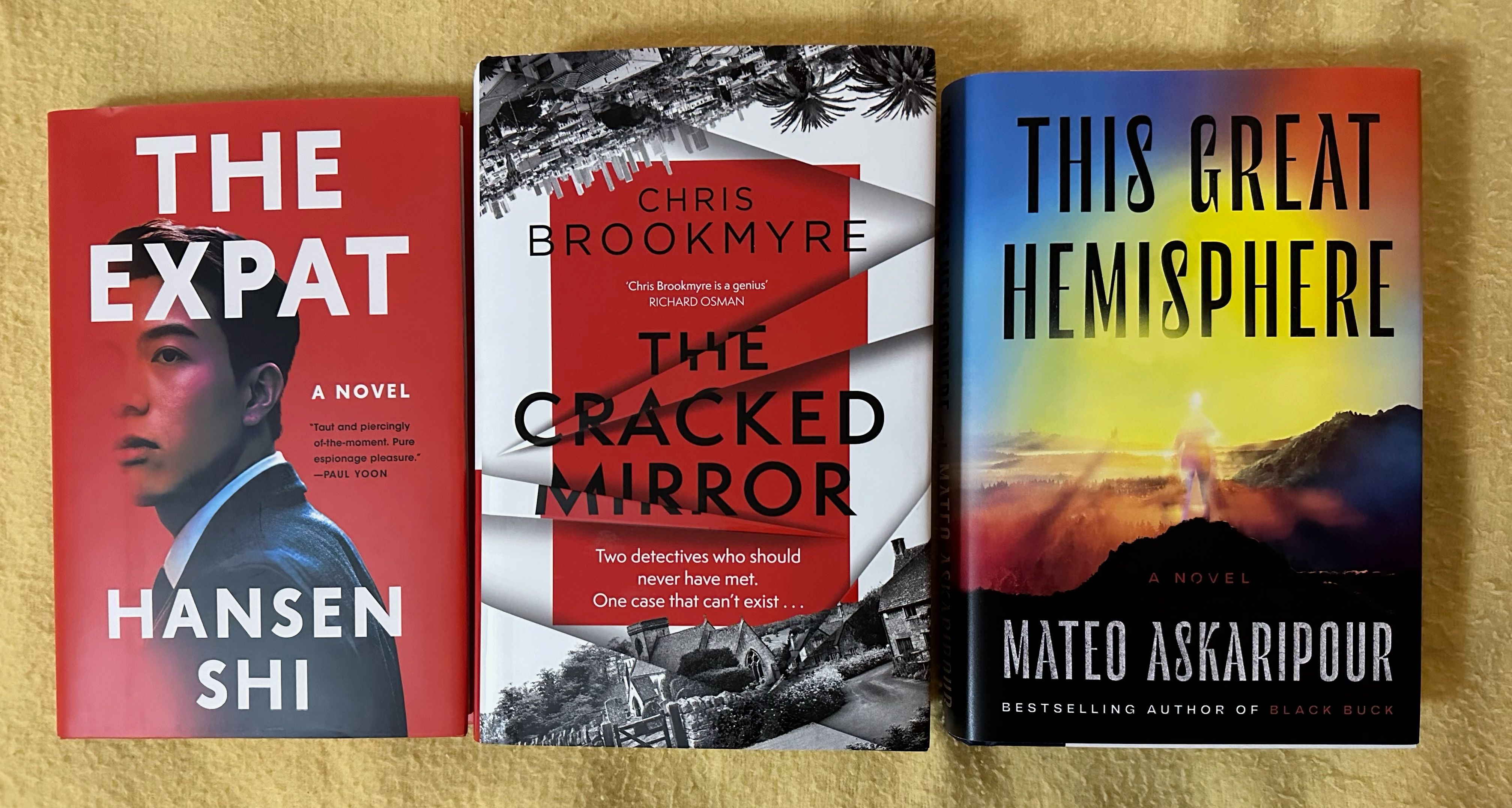IYCRMM: A mixed bag of curious delights
Our reading list this month is eclectic, to say the least, from literary SciFi to mystery thriller, all marked by impressive world-building and storytelling

The Cautious Traveller’s Guide to the Wastelands by Sarah Brooks
Set in an alternative steampunk 1899, this novel is, at its core, an adventure saga that takes place primarily on a 20-car train—the Trans Siberian Express. Traveling from Beijing to Moscow over some 15 days, and across the Wastelands, the Express represents both luxury and danger. The Wastelands in this fictitious version is a Siberia teeming with unusual wildlife, with phantasmagorical phenomena, and strange bizarre occurrences, such that there’s something called the Wastelands sickness, which easily afflicts passengers on the Express, if they aren’t careful and vigilant. A diverse cast of characters join the journey, each with an intriguing back story as to why they’ve boarded the train.
There’s Zhang Weiwei, 16, whose whole life has been on board the train, where her Mother died in childbirth, and she’s been “adopted” by the train’s Captain. The new set of passengers on this specific fateful journey include Marya Petrovna who, traveling under a false name, is out to find justice for her late father who ran a glassworks company in Beijing. Then there’s disgraced naturalist Henry Grey, seeking redemption via scientific specimens from the Wastelands, as well as the stowaway Elena, who’s discovered by Weiwei as a shadowy figure sympathetic to the wildness happening outside the train. As a debut novel, this allegorical tale about the natural world, about capitalism and empire, is brimming with confidence. It neatly balances the otherworldly with the events on the train.
The God of the Woods by Liz Moore
Set in 1975, the novel opens with Barbara Van Laar going missing at a summer camp that’s located on the family estate. She’s 13 years old, daughter of the owner of the property surrounding the camp, and it’s reported how 14 years earlier, her elder brother Bear also disappeared. Nestled at the foot of the Adirondack in upstate New York, the novel hinges on multiple narrators or perspectives, in order to paint an engrossing portrait of the community its dynamics. At one level, it’s about this rich, moneyed family and their circle who drive up from Manhattan, and the blue-collar workers of the family estate and summer camp. Then there’s the family tragedy and misfortune hounding the Van Laars.
There’s extremely effective storytelling that jumps back and forth in time, going back to 1961 and Bear’s disappearance, and even the courtship of Peter and Alice, parents of Bear and Barbara. Judyta, one of the investigators when Barbara vanishes, has chapters of her own, and it’s through her eyes that we come to understand the attitude of the local populace toward the Van Laar family through history. They’re interlopers, but bring money and jobs. They wield power and influence, and we’re ready to place the blame for Bear’s “abduction” at the feet of a local, who most felt was innocent of the charge. The novel becomes a fascinating study of conflicting social circles, of deep and dark family secrets, of inheritance and second chances. By recounting a family tragedy, or two, we have this literary mystery thriller.
Service Model by Adrian Tchaikovsky
For the first half of this novel, it would seem that Tchaikovsky has hit the motherlode, with a humor-filled, deadpan exposition of the existential life of a service android. Charles is the Valet Unit of a recluse millionaire, rendering service along with a host of other specific task-oriented robots in his mansion. It’s what happens when Charles is shaving his master and accidentally slits his throat. What now is his purpose in this world? With no master, is his very existence negated, and what’s to become of him? What follows is a picaresque, quixotic search for new purpose in a world where humans are now a scarce commodity, and Charles just keeps running into other robots.
A commentary and satire on artificial labor and service, this novel is still another example of the wonderful world-building that’s become a Tchaikovsky trademark. It’s all written in such a tongue in cheek, emotionless manner, that we can’t help but laugh at the “serious absurdity.” While an intelligent AI, Charles is so street dumb he has to rely on another robot named Monk to go below the surface of what’s being said to him. There is a robot ecosystem that’s just as hierarchical and crazy as what humans have constructed over history. And when Charles runs away from Central Diagnostics, we are treated to a road trip that explores this post-dystopian world, visiting a Central Library, a community of human Luddites, a robot “God,” and the lesson humanity had to learn the hard way.

The Expat by Hansen Shi
Princeton graduate Michael Wang is 26, and working on autonomous driving technology for General Motors, when we first meet him in this novel. Born in New Jersey, he’s a second gen Chinese-American, and feels unappreciated in the San Francisco GM branch, so it doesn’t surprise us when he receives a flattering message from Vivian on a coding platform where he moonlights, and decides to meet up with her. She makes mention of an Uncle Bo, who works in Beijing for an automotive company that’s also pushing for the same self-driving car technology. An invitation to a Beijing conference, followed by a job offer to stay in China, follows. Against his better judgment, motivated by a chance to start a new life with Vivian, Michael accepts the offer.
Strings attached to the extravagant package and signing bonus include downloading all the work he was involved in at GM, and bringing it with him to China. Without meaning to, Michael is thrust into a world of industrial espionage and counterintelligence. The novel takes on hubris, meritocracy as a myth, the ugly side of immigration, identity, and the almighty pursuit of recognition. There’s suspense aplenty as Michael engages in a cat and mouse game with Uncle Bo, a person not to be treated lightly, as he has had years of experience in luring scientists into—and being being part of—the machinery pushing for Chinese dominance in the world of high technology. Vivian also remains an elusive shadow of the life Michael has envisioned and how it goes up in smoke as she vanishes from the narrative.
The Cracked Mirror by Chris Brookmyre
Brookmyre was challenged to write this crime novel, as his editor was saying no one was putting together the two types of crime fiction that’s currently most popular, postulating if it was even possible—cozy mystery on one hand, and hard-boiled noir detective tale on the other. Always ready to prove he’s up to the challenge, we now get this crazy blended mystery thriller. The first chapters introduce us to Penny Coyne, who lives in a Scottish village. At 80, this little lady helps the local police force solve murders and crime. Then, we’re whisked to Los Angeles, and meet Johnny Hawke, a LAPD homicide detective perpetually at odds with his superiors, and notorious for losing his partners on duty accidents.
Chapters are first alternating between the two, and the respective crimes they’re enmeshed in. Then Brookmyre does the inevitable, bringing the two together on the strength of a wedding invitation and a dead Hollywood writer, keeping it all plausible. They’re like an extremely odd couple, and in this conjoining of narrative strands, Brookmyre drops hints of why this union would be inevitable, or have bigger stakes at play. When the reveal does happen, it’s one of those jaw-dropping moments a reader decides if he’ll take a bite, or refuse to accept what he’s reading. It’s a battle for truth as we’re asked to suspend disbelief and go deep down the rabbit hole that Brookmyre has conjured up. As a result, it’s not just a conjoining of types of crime fiction, but also the author’s own entertaining take on the multiverse.
This Great Hemisphere by Mateo Askaripour
Mateo Askaripour is the author of Black Buck, a brilliant comedy about race discrimination in the corporate world. I was pleasantly surprised to find him stretching himself in this second novel. It takes place in the future (26th century), where the quest for inclusivity and social justice continues. Askaripour’s main protagonist here would be Sweetmint (Candace), a young woman who, by virtue of being a second class citizen, has been “invisible” since birth. Her older brother disappeared when she was much younger. He was presumed dead. Now he has resurfaced but as the main suspect in the murder of Chief Executive Rhitel, leader of the Northwestern Hemisphere. This premise of invisible individuals is a strong one that speaks of how in this imagined future, the notion of the unnoticed and marginalized literally renders these people invisible.
When unpainted, these invisibles wear collars, as enforced by the DP’s (Dominant Population). Apprenticed to the Grand Architect Croger Tenmase, we follow Sweetmint as she interacts with the DP’s (Dominant Population). A manhunt for her brother Sweetsmoke is organized, with the promise that he’ll be captured in five days, before the National Election while Sweetmint is convinced he’s innocent. The actions taken to find and protect her brother takes up the narrative and offers us a guided tour of this complex society that Askaripour has imagined. There’s a relentless law officer, as well as ambitious politicians, all part of this world built on non-truths and manipulation. Power, ambition, and how perception rules become major themes of this thrilling adventure. With hope, it’s only the first installment of a continuing saga.